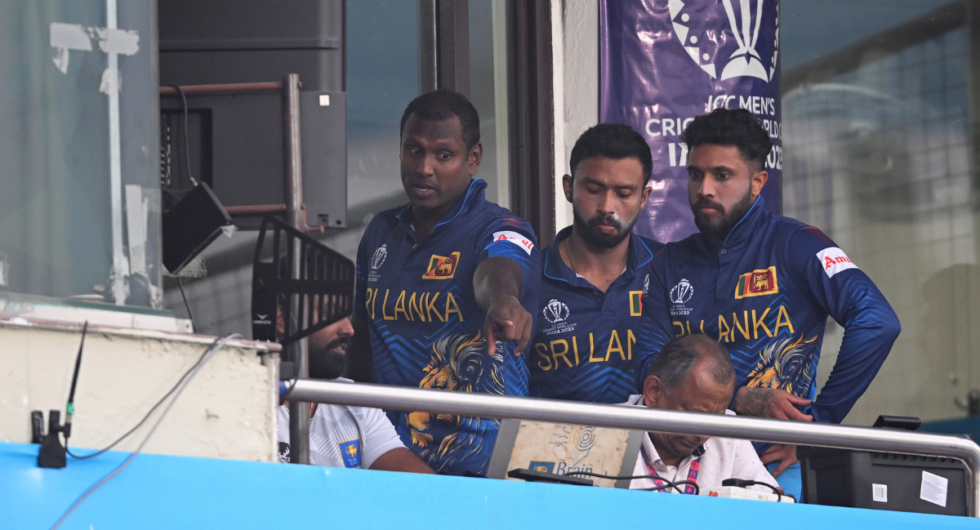Angelo Mathews’ ‘Timed Out’ dismissal was legal, and that’s the problem

Angelo Mathews became the first batter in the history of international cricket to be given out ‘Timed Out’ during Sri Lanka’s clash against Bangladesh in Delhi today (November 6).
Despite the rareness of the dismissal, it’s hard to fathom that in the 146-year history of international cricket, it’s not needed to be used once. There have been several incidents where it has nearly come into play, most memorably when Sourav Ganguly was reprieved in 2007 during a Test match against South Africa when Graeme Smith chose to appeal. The dismissal also comes up every so often in first-class or other domestic competitions.
Regardless of how often it comes into use, it is important to have a rule in place. It prevents time-wasting in the case of a team searching for a draw in the fourth innings. It also can help lessen already drearily slow over-rates. However, Mathews’ dismissal today shows that the current law is in need of reform.
The relevant law in this case comes from the ICC playing conditions for the 2023 Men’s World Cup, which supersede the MCC Laws. The Laws are practically identical apart from the length of time which they allow between a dismissal and the next batter to be ready to face the first ball of their innings. While the MCC specify that time period as three minutes, the ICC specify it as two. In T20I matches, it’s 90 seconds.
The first part of the ICC Playing condition reads: “After the fall of a wicket or the retirement of a batter, the incoming batter must unless Time has been called, be ready to receive the ball or for the other batter to be ready to receive the next ball within 2 minutes of the dismissal or retirement. If this requirement is not met, the incoming batter will be out, Timed out.”
In Mathews’ case, the reason he wasn’t “ready to receive the ball” when he came out to bat was that the chin strap on his helmet was broken. While in this particular circumstance, Mathews could have waited for the next ball or even until the end of the over to request a change given a spinner was bowling, the law allows no leeway in case of an unforeseen problem with protective equipment to be rectified without the batter being in danger of being given out. Had there been a fast bowler on, Mathews should not have had to choose between properly working safety equipment and potentially being given out before he faced a ball. And yet there can be no argument that by the letter of the current law, what happened today was the correct decision.
Angelo Mathews has become the first batter in international cricket to be given out ‘timed out’.
Remarkable scenes in Delhi 😮#BANvsSL #CWC2023 pic.twitter.com/um9R5x90bP
— Wisden (@WisdenCricket) November 6, 2023
That brings out the most important part of why the current law needs to be updated. It leaves too much power in the hands of the fielding side to decide whether the dismissal should be enforced. Today, the umpires reportedly asked Shakib Al Hasan if he would withdraw his appeal twice but were powerless to overrule the decision once he refused. In the case of genuine emergencies or unforeseen circumstances, there is too much power concentrated in the hands of the fielding captain, who is more often than not one or a combination of: Desperate for victory, under immense pressure or still with adrenaline coursing through them after a wicket’s gone down.
In Ganguly’s case, two wickets had gone down in quick succession and there was confusion in the dressing room over whether Sachin Tendulkar was allowed to come into bat. A clarifying message to the dressing room from the umpires had also gone missing, and as a result, Smith was able to make the decision not to enforce the rule. Shakib made the opposite decision today, having taken the previous wicket himself, the fourth early in the innings with his side having won just once in the competition so far and desperately trying to secure Champions Trophy qualification. It’s not a dig at Shakib; he was within his rights to appeal. But, nuanced decisions that happen so rarely should not be left completely in the hands of on-field captains, with different ideas about what constitutes a fair dismissal. Sport is about consistent application of the rules, not the mood of the person you find yourself up against.
Instead, it should be at the umpire’s discretion to decide whether the appeal of a fielding side is upheld, or whether there were exceptional reasons they did not take the field within the timeframe. The umpires shouldn’t be powerless once the appeal has been made and should be in control of events on the field, in a way that they clearly weren’t today.
While the events in Delhi today may have made for great theatre, and added another layer to a contest between two bottom-half-of-the-table teams, laws aren’t there to be quirky. They aren’t there to create meme-able send-offs or clutching of pearls over the ‘Spirit of Cricket’. They’re there to facilitate the game, even if the process and minutiae of them can, at times, be nauseatingly tedious and pedantic.
To bet on the World Cup with our Match Centre Partners bet365 head here.

